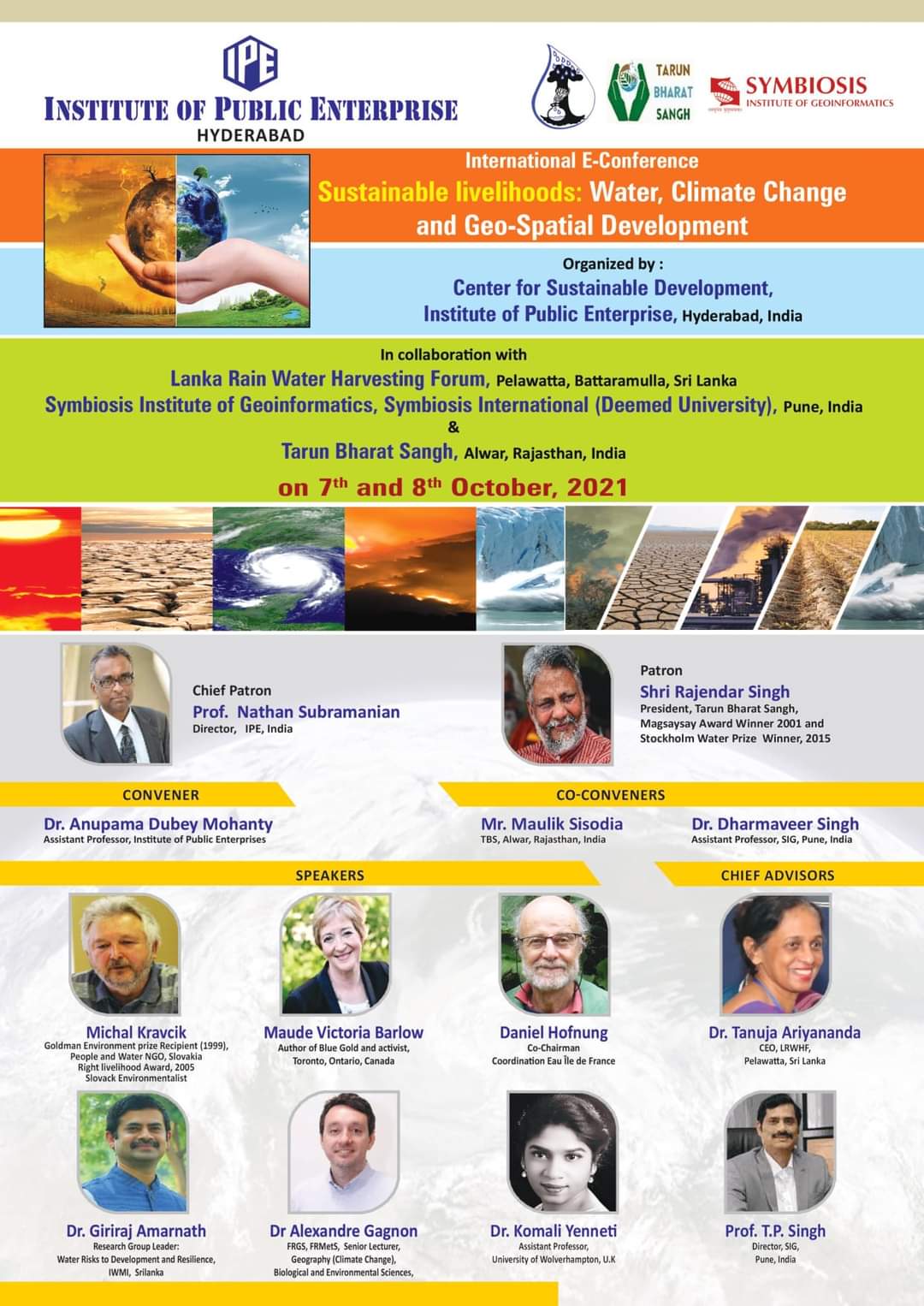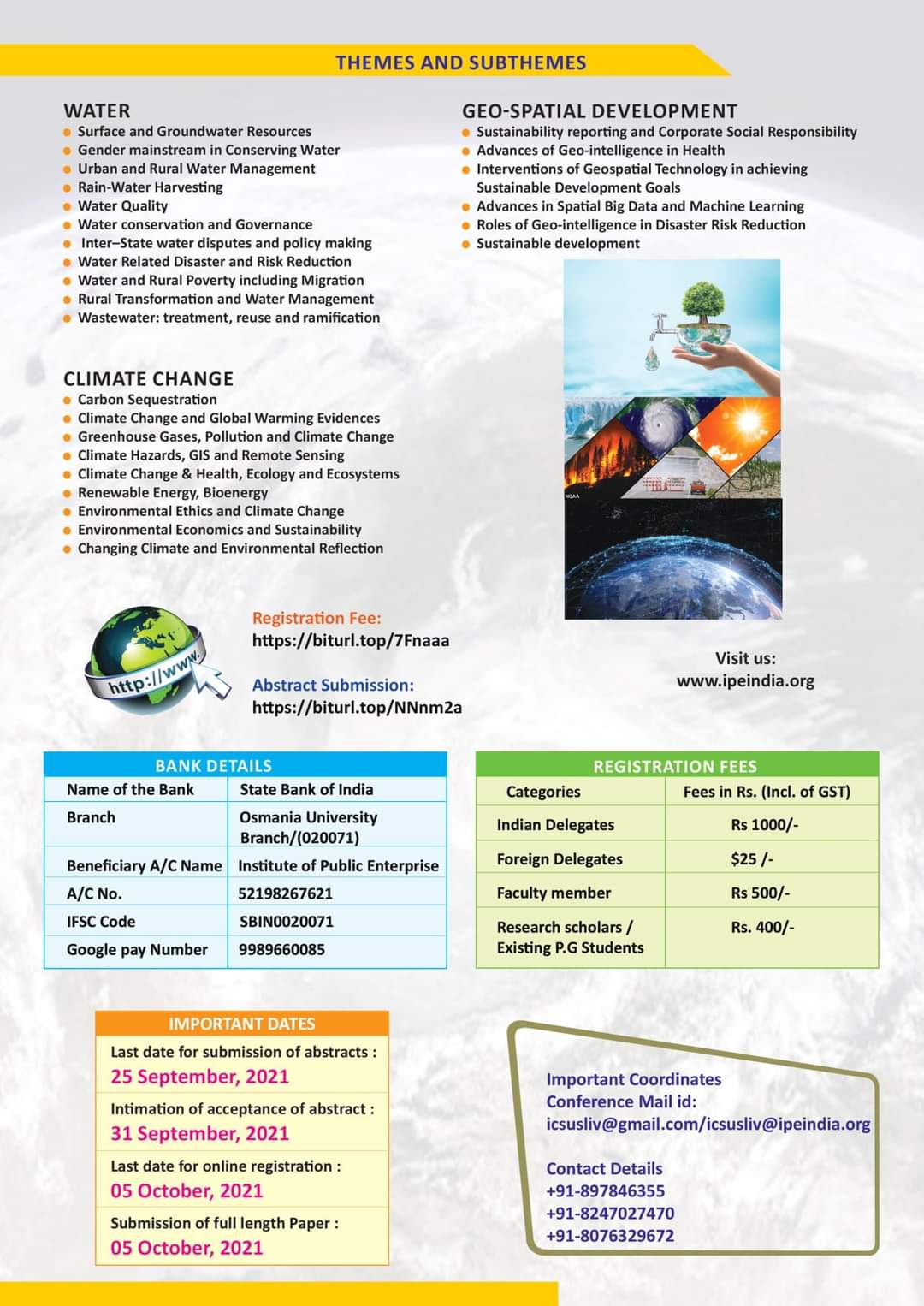About the Conference
In the twenty-first century, livelihoods will be required by two or three times the current human population. People, their capacities, and their means of subsistence, such as food, income, and possessions, make up a livelihood. Resources and stores are tangible assets, whereas claims and access are intangible assets. A livelihood is ecologically sustainable if it preserves or improves the local and global assets that livelihoods rely on, as well as having net positive impacts on other livelihoods. A socially sustainable livelihood is one that can cope with and recover from stress and shocks while also providing for future generations. New conceptions and analyses are required for policy and practice. Future generations will outnumber us by a large margin, yet they will be unrepresented in our decision-making. Current and traditional analyses are both gloomy and undervalue future lifestyles. Small-scale economic synergy, as well as boosting resource-use intensity and the diversity and complexity of small-farming livelihood systems, can be used to increase livelihoods. The ideas of net sustainable livelihood impacts and intensity need to be tested. They include balancing issues like environmental and social sustainability, as well as net impacts from competition and externalities. The goal of sustainable livelihoods for everyone offers a focal point for thinking about the twenty-first century and identifies policy and research objectives. Personal environmental balance sheets for the better off and the poorest, policies and measures to build capacities, promote fairness, and raise social sustainability are all policy implications. Besides that, globally, concerns for the environment and human well-being have increased as a result of threats imposed by climate change and disasters, environmental degradation, pollution of natural resources, water scarcity and proliferation of slums. Finding appropriate solutions to these threats and challenges is not simple, as these are generally complex and require state-of-the-art technology to collect, measure, handle and analyse large volumes of varying data sets. However, the recent advances in sensor technology, coupled with the rapid development of computational power, have greatly enhanced our abilities to capture, store and analyse the surrounding physical environment. Therefore, the conference is planned to provoke discussions by exploring and elaborating the concept of Sustainability, and it’s symbiotic relationship with existing water resources and surrounding climate and geo-spatial development
Themes and Subthemes
- Water :
- Surface and Groundwater Resources
- Gender mainstream in Conserving Water
- Urban and Rural Water Management
- Rain-Water Harvesting
- Water Quality
- Water conservation and Governance
- Inter–State water disputes and policy making
- Water Related Disaster and Risk Reduction
- Water and Rural Poverty including Migration
- Rural Transformation and Water Management
- Wastewater: treatment, reuse and ramification
- Climate Change :
- Carbon Sequestration
- Climate Change and Global Warming Evidences
- Greenhouse Gases, Pollution and Climate Change
- Climate Hazards, GIS and Remote Sensing
- Climate Change & Health, Ecology and Ecosystems
- Renewable Energy, Bioenergy
- Environmental Ethics and Climate Change
- Environmental Economics and Sustainability
- Changing Climate and Environmental Reflection
- Geo-Spatial Development
- Sustainability reporting and Corporate Social Responsibility
- Advances of Geo-intelligence in Health
- Interventions of Geospatial Technology in achieving
- Sustainable Development Goals
- Advances in Spatial Big Data and Machine Learning
- Roles of Geo-intelligence in Disaster Risk Reduction
- Sustainable development
Submission of Abstract & Full Paper
Authors are requested to submit their original research contribution in the form of an abstract with specified subtheme, not exceeding 300 words with maximum 5 key words, 1.5 spaced, 12 fonts, Times New Roman, justified on both sides. The abstract must carry the author’s name, designation, aflliation, contact number with STD or ISD code (e.g. +91- 980000000) and email id. The abstract must contain a brief introduction, objectives, methodology, database, major findings and keywords. The authors may submit their full length paper after getting the letter of acceptance of the abstract from the organizers. In that case the format of the full length paper will be the same as the abstract. The full paper must not exceed 7 pages including all the tables, diagrams, maps, references, title and particulars related to the author(s). It is highly expected that the contributions should be authentic as per the research ethics of antiplagiarism. Both the abstracts and full papers have to be submitted to the following email I’d icsusliv@gmail.com
Publication
The abstracts and papers will be accepted after the process of review by an expert committee and on the basis of their recommendations, selected number of paperswillbepublished in an editorial volume of SpringerNature Series/Routledge with ISBNnumber .
IMPORTANT DATES
Last date for submission of abstracts : 10 September, 2021
Intimation of acceptance of abstract : 15 September, 2021
Last date for online registration : 31 September, 2021.
Submission of full length paper : 05 October, 2021
Bank Details





